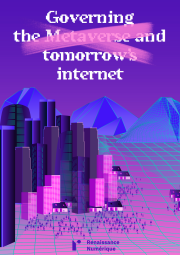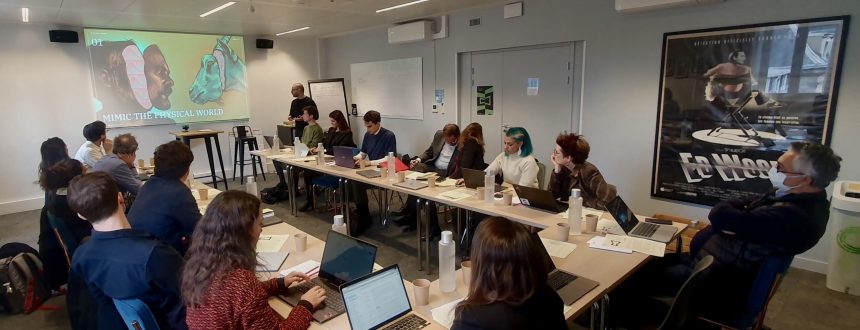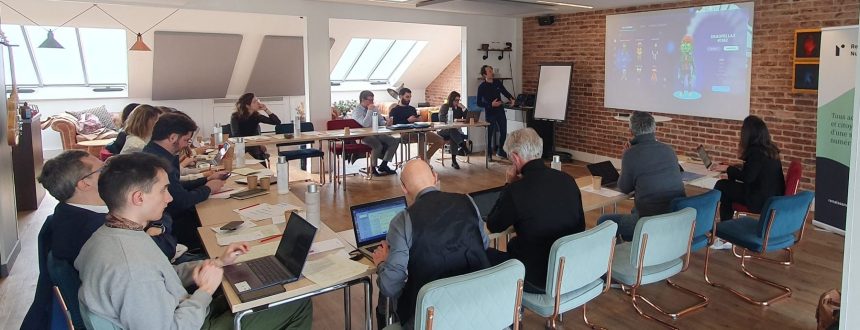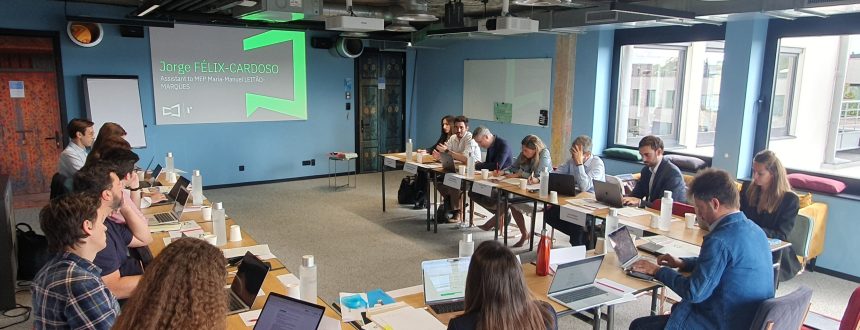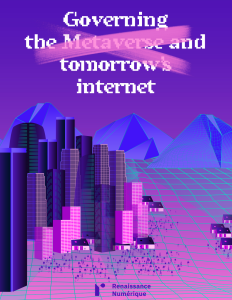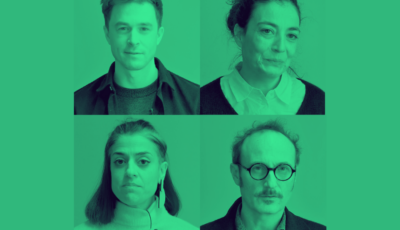Publication 22 November 2023
Governing the Metaverse and tomorrow’s internet

Objectives and methodology
- Shed light on the debates surrounding the stakes and issues related to the Metaverse, by offering an interpretation through the lenses of the humanities and social sciences, the history of science and technology, and economics and politics. This is done from the viewpoints of various stakeholders: academic researchers, institutional and economic players, in particular.
- Draw up recommendations, and useful questions to ask, aimed at decision-makers, especially politicians, regulators, and even researchers.
- Continue to foster dialogue with all the experts and civil society around the future of our immersive digital interactions.
This report is based on the many discussions that took place as part of, and alongside, the three-day Metaverse Dialogues, organised by Renaissance Numérique, on a wide-ranging analysis of the literature on the subject (books, reports, articles) and on the results of the qualitative study “Metaverse representations and uses”, which the think tank published in October 2023.
This publication and the Metaverse Dialogues were produced with Meta’s financial support, obtained as part of the XR Programs and Research Fund aimed at supporting academic and independent research across Europe into metaverse issues and opportunities. As such, Renaissance Numérique is a member of the European Metaverse Research Network. Like all the think tank’s work, this report has been produced completely independently.
Main findings
The Metaverse will probably never exist. Metaverses will. The Metaverse, as a universe of interoperable digital worlds and environments, enabling an unlimited number of people to enjoy immersive, collective, and synchronised experiences, seems hardly feasible today. And undoubtedly undesirable, given the environmental resources required, for possible uses that currently offer little added value compared with those that already exist. However, billions of interactions in immersive worlds, particularly video games, take place every day. These foreshadow emerging metaverses, whether or not they are proprietary or centralised, but probably limited in their interoperability and synchronicity.
The Metaverse is a “boundary object”. It is a catalyst for diverse and varied representations, which set in motion and gather around it ecosystems of heterogeneous players who initially evolve in different worlds. As a result, there is a great deal of confusion about what the Metaverse is, could be or should be, since a wide range of cultures, interests, knowledge, representations, imaginations and know-how continually meet and clash around this “concept-object”1. In 1992, Al Gore described the information superhighways as a performative utopia that would set the world in motion and give rise to numerous technological investment programmes for the construction of a planetary communications network. In 2021, Mark Zuckerberg did the same with the Metaverse, even though the concept already existed.
The Metaverse is a heuristic and practical laboratory. It enables us to collectively imagine and discuss what we want tomorrow’s internet to look like, whether it’s immersive or not. By bringing together a wide range of social, economic, environmental, cognitive, ethical, and legal issues that are being raised today in relation to digital uses, the Metaverse enables us to envision ourselves in tomorrow’s internet. Without wiping the slate clean of the past, but by taking root in what already exists, in what works and what doesn’t, in what is satisfactory and what isn’t, the Metaverse enables us to envisage together the ways in which we want to communicate, socialise, cultivate, entertain ourselves, trade, and so on. This collective discussion enables us to review laws, principles, and values from a more egalitarian, more inclusive, more ethical, and more environmentally friendly perspective – in other words, more responsible, for the society we want to build and see emerge – than they are today.
Paul Fehlinger,
Director of Policy, Governance, Innovation, and Impact, Project Liberty’s Institute
While legal frameworks already exist to protect individuals from a wide range of criminal offences and harmful conduct that may take place in metaverses, both nationally and internationally, this framework could be improved by making definitions more harmonised; for example, there is no common definition of online hate at European level. This is a major gap in the European legal system concerning the protection of internet users. Furthermore, although the legal framework applicable to metaverses is relatively comprehensive, it suffers from inconsistency. This legal inconsistency, and the lack of prioritisation between the various existing rules, results in a somewhat ineffective framework. Thus, more immersive social interactions, in which bodies are involved, call for a renewal or updating of our approaches, or at least our questioning, with regard to inclusion, ethics, multiculturalism, and viewpoint diversity. These developments provide an opportunity to rethink internet governance, by including all stakeholders, particularly users and citizens. They offer the opportunity to implement governance that is truly multi-stakeholder, more agile, and that leaves more room for experimentation, for everyone’s benefit.
The Metaverse is therefore an opportunity to bring together “all the questions surrounding the development of digital technology in the years ahead”2. In this respect, it represents a fantastic opportunity to collectively question the digital world and the internet we want. Renaissance Numérique seized this opportunity by organising the Metaverse Dialogues. This report is an expanded and substantiated presentation of the conclusions reached. The think tank encourages furthering the discussions that the Metaverse has engendered in order to draw up, with all the stakeholders
concerned, the outlines of a desirable and responsible digital society.
1 Musso P., Coiffier S., Lucas J.-F (2015), Innover avec et par les imaginaires, Manucius, pp.71-75.
2 LINC (2023), Data, footprint and freedoms. Exploring the overlaps between data protection, freedoms and the environment, IP Reports, Innovation and foresight, n°9, p. 25.
Our 6 recommendations for a better gouvernance of tomorrow’s internet
Recommendation #1
Recommendation #2
Recommendation #3
Recommendation #4
Recommendation #5
Recommendation #6
Continuing the Dialogue
The Metaverse creates tension between the different types of development possible, each encapsulating models that are sometimes opposed in the technologies, values, and principles that underpin or govern them. In this way, it highlights societal choices that go beyond those of our digitised interactions, and highlights our dissatisfaction with those we make on a daily basis. But what voice does civil society really have in these discussions and stances? If charters and declarations of good intentions represent its interests, what levers can we put in place to develop (or not) one or more metaverses that reflect society’s choices?
Tthe question of the territoriality of the law applicable in the Metaverse is likely to prove thorny. While the law is inevitably territorial, one of the Metaverse’s promises is, inversely, to be able to engage in digital experiences that are territorially undefined and synchronised with an infinite number of people. If this promise follows Marshall McLuhan’s vision of the global village, a diversity of cultures will probably coexist in the Metaverse, since this is already the case in our online interactions. Will the reconciliation of different meanings, understandings and applications of rights, conventions, and standards call for a territorialisation of the Metaverse? Should we also, as MEPs Axel Voss and Ibán García del Blanco suggest, examine the idea of a special legal status for avatars?
Ultimately, we need to understand the Metaverse as a concept that allows us to anticipate possible immersive uses, which leads us to anticipate certain regulations, but which also updates and questions a large number of concepts that often pre-existed the uses, and therefore the adoption, of any technology. Consequently, over and above the discussions about the possible uses of the Metaverse, which occupy a (probably overly) significant place in the debates between experts and in the media, we need to take a closer look at the technological and societal imaginaries that are reflected in the various representations of the Metaverse, or that these representations bring to light. It is only by understanding, sharing, and discussing them that we will collectively find the way to build, whether responsibly or not, our future digital interactions.
You have a question? Want to get in touch? Contact us at: contact@renaissancenumerique.org
An interactive report!
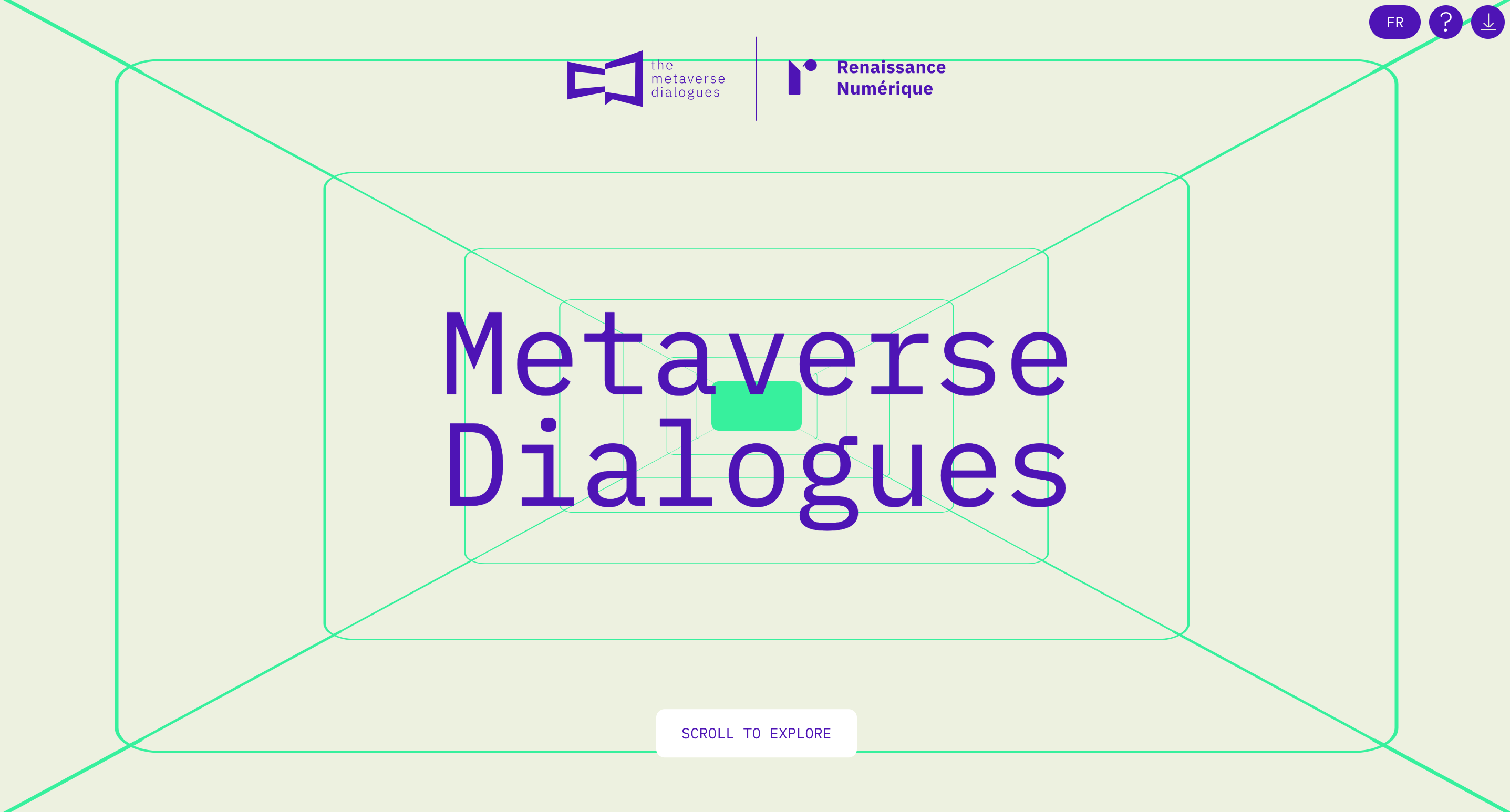
You can also explore the content of this report in an interactive way at www.metaversedialogues.org/en. You’ll discover an alternative narrative architecture, allowing a different kind of immersion in the findings and recommendations of this collective exploration. We wish you a pleasant immersion in the governance of the Metaverse and of tomorrow’s internet!
-
Event

Metaverse Dialogue #3 - Data, privacy, identity: potential legal challenges
Wednesday 5 July, 9.00am-6.00pm
Brussels

